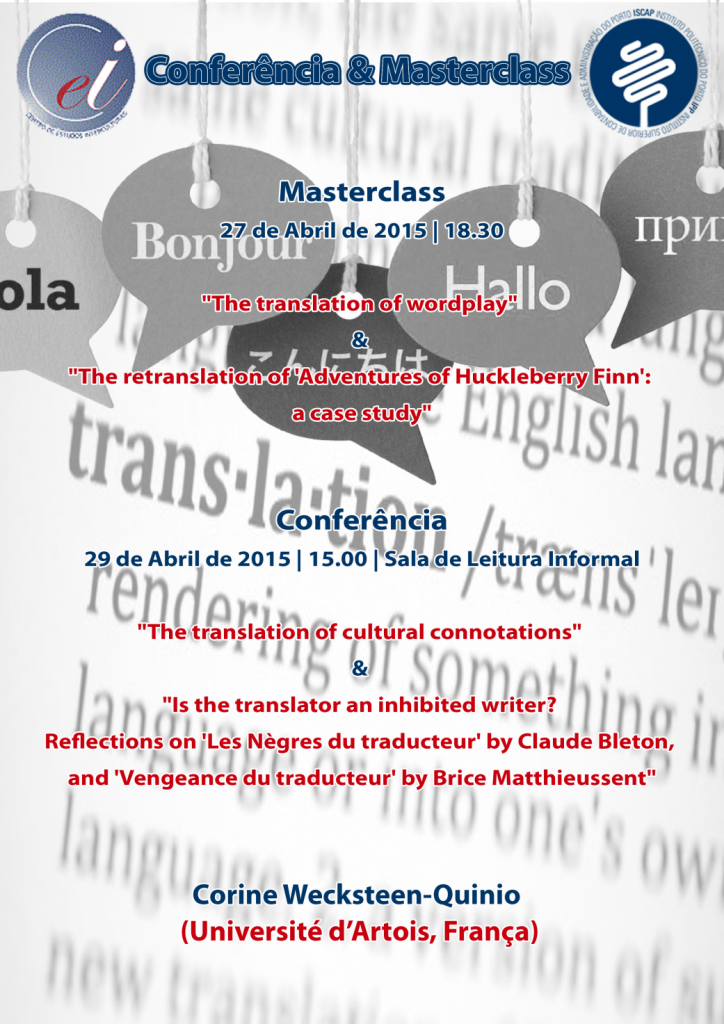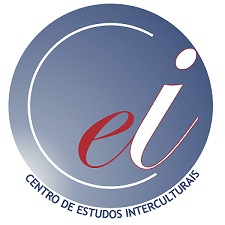
27 April 2015 | 18.30 | Lab. 1, ISCAP
MASTERCLASS
“The translation of wordplay”
This class will deal with the translation of wordplay. Wordplay is supposed to have a humorous effect and this should be rendered as efficiently as possible when translating. But how can one avoid losing the sense of humour, or rather the senses of humour, in the process of translation from one language to another? Puns are indeed based on ambiguity and implicitness in particular and the way they are appreciated varies, which relates them to connotative phenomena. With the help of a number of examples, we will study the strategies used by translators to convey the double meaning of such utterances, working as they are under the constraint of words but also with the freedom of writing accorded to them by their status as co-authors of the translated texts.
“The retranslation of ‘Adventures of Huckleberry Finn’: a case study”
The various French translations of Mark Twain’s Adventures of Huckleberry Finn have often been criticised for their translational flaws, especially in the way they have handled the language specificities in the novel. We will try and see how the new translation by Bernard Hoepffner, published by Tristram in 2008, breaks with some earlier versions as to the way Huck’s voice has been translated. Attention will be devoted to the project underlying the new translation, which will be put to the test through the examination of quantitative but mostly qualitative aspects and the study of various markers (lexical, phono-graphological, morphological, syntactic and grammatical) that show how inventive the translator has been. The last part of the presentation will focus on the reception of this translation in France and on the qualifications that might be brought to bear on this unanimously acclaimed work.
29 April 2015 | 15.00 | Library, ISCAP
CONFERENCE
“The translation of cultural connotations”
This conference will deal with the problem of translating culture-bound elements, since a translator not only has to translate words but culture as well, which is a sign of ‘otherness’ and is part and parcel of a text. Our study, based on a corpus of 20th-century English and American short-stories and novels, will try to examine the solutions used by translators to convey the ‘otherness’ of the ‘foreign’, bearing in mind the fact that culture is often implicit and can be likened to the concept of connotations. Emphasis will be laid on the problems posed by the translation of English cultural connotations into French as well as the strategies used by translators. Specific attention will be devoted to the factors that make the translator choose between keeping foreign elements and domesticating the text, which will in turn throw light on the dialogical process at work between the two languages/cultures that come into contact.
“Is the translator an inhibited writer?
Reflections on ‘Les Nègres du traducteur’ by Claude Bleton,
and ‘Vengeance du traducteur’ by Brice Matthieussent”
This conference will explore the link between translation and writing, focusing on two works of fiction, Les Nègres du traducteur by Claude Bleton, and Vengeance du traducteur by Brice Matthieussent. These novels share a common characteristic: they were written by translators making their debut as novelists. Moreover, the characters – and this is hardly coincidental – are themselves authors and translators through an audacious and thought-provoking role reversal and mise en abyme. This double movement will lead us to examine the translator’s status and his relationship with the author while factoring in notions of hierarchy, power and paternity. We shall envisage the death of the author from both a symbolic and physical viewpoint, and reexamine the relationship between translation, writing and creativity. We will see that this role reversal between author and translator in the novels allows us to reevaluate certain preconceptions about translators and to underscore the ‘dual’ nature they derive from acting as go-betweens for two cultures and two intimately linked activities: translation and writing.
Bionote
Corinne Wecksteen-Quinio holds an Agrégation in English and is a Senior Lecturer/Associate Professor at the Université d’Artois, where she teaches Translation (English-French) and Translation Studies. She received her PhD in Translation Studies from the Université d’Artois in 2005, under the guidance of Professor Michel Ballard. Her research interests include the translation of connotations, wordplay, culture-bound elements, proverbs, loanwords, allusions, as well as the link between translation studies and the teaching of translation (didactics), and the relationship between translating and writing. She has published several articles on those topics, published by various editors (Peter Lang, Artois Presses Université, L’Harmattan, Presses de l’Université de Montréal) and co-authored a book on false cognates with Michel Ballard. She has also participated in a textbook of translation (from English into French) which argues in favour of translation commentary as a useful methodological tool to improve students’ translation competence (La traduction anglais-français, Manuel de traductologie pratique, Lefebvre-Scodeller Cindy, Michaël Mariaule et Corinne Wecksteen-Quinio, Bruxelles/Louvain-la-Neuve, Editions De Boeck, collection « Traductologie », 2015).

